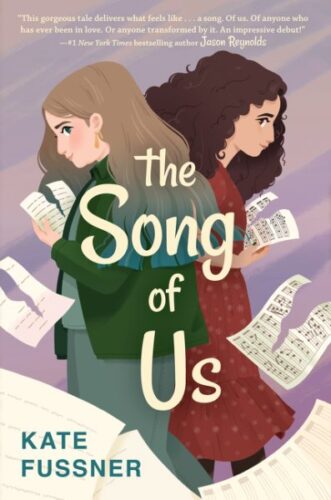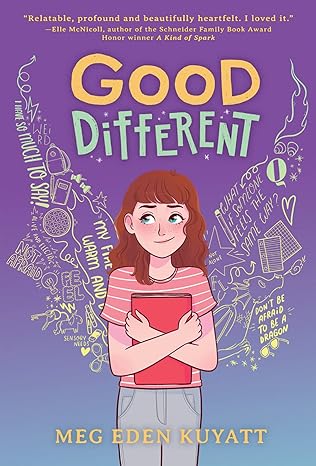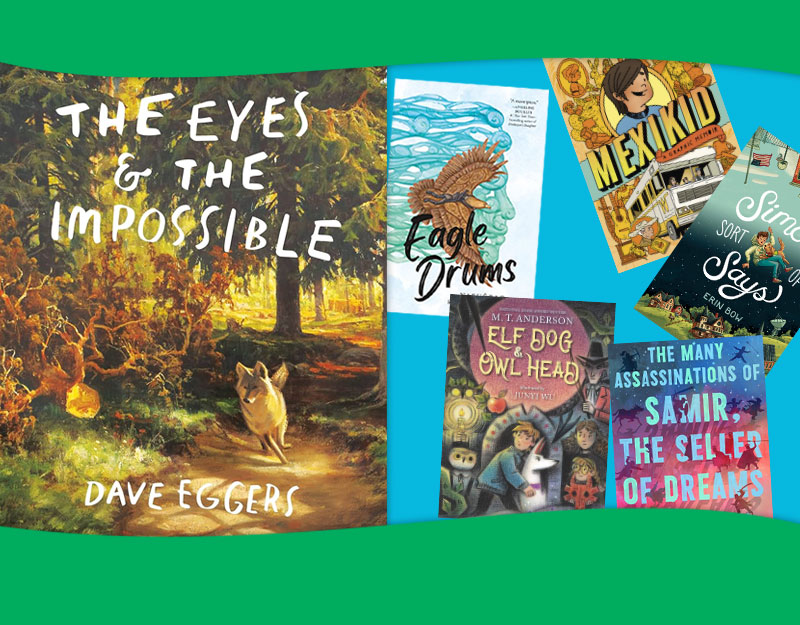Wednesday Round Up: Books in Verse
Taking a look at 2024 Newbery contenders, there are a large amount of books in verse. And when I look at the list in whole, I’m impressed with the variety of verse novels this year. Writers are really showing how verse can be taken in many directions. Interestingly enough, if books in verse won all the Newbery honors and the medal- there still would be a variety of book types as winners.
Looking at our nomination list, we have five books in verse nominated:
EB & FLOW (multiple voices, excellent delineation of character, but does it fit all six Newbery criteria?)





THE SONG OF US (received a lot of suggestions, but only two nominations so far- Fussner tackles a lot in this book with verse, a retelling of Orpheus and Eurydice and queer romance… does she tackle too much?)
ADVERTISEMENT
ADVERTISEMENT
GOOD DIFFERENT (a book in verse that dives deeply into neurodivergence and feelings– is it an accurate deep dive?)
WHEN CLOUDS TOUCH US (sequel to Newbery honor winner INSIDE OUT AND BACK AGAIN… contains most of the same strengths of the first… is a repeat in Lai’s future?)
MIRROR TO MIRROR (another two voices verse book, portraying twins relationships with one another and themselves… more excellent delineation of character here)
and three verse novels suggested but not yet nominated. NEARER MY FREEDOM, ANIANA DEL MAR JUMPS IN and NO MATTER THE DISTANCE.
Do you have thoughts on any of the above books? Or other books in verse that might not be on our radar yet?
Take a look at our past Wednesday round ups here and stay tuned for next weeks one on top nominated titles.
Filed under: Book Discussion
About Emily Mroczek-Bayci
Emily Mroczek (Bayci) is a freelance children’s librarian in the Chicago suburbs. She served on the 2019 Newbery committee. You can reach her at emilyrmroczek@gmail.com.
ADVERTISEMENT
ADVERTISEMENT
SLJ Blog Network
Notes on April 2024
Lifetime Achievement Awards and Upcoming Books: A Talk with Christopher Paul Curtis
Review| Agents of S.U.I.T. 2
Navigating the High School and Academic Library Policy Landscape Around Dual Enrollment Students
Book Review: The Kids in Mrs. Z’s Class books 1 and 2
ADVERTISEMENT








I like the way EB AND FLOW uses the form. Most of the text reads like natural language, rather than verse, with line breaks rather than paragraphs, and that works fine. Eb and Flow have distinct voices, the shortness of most passages keeps us jumping back and forth regularly. But there are moments, often at the end of a section, where, as in verse, a line or two takes on more significance. It’s like the rapid-paced narrative slows down for that moment and we readers step back and see the kids from a broader view.
Like when Mr. Warren is lecturing Flow on page 6. A few lines in, there’s “You / Don’t / Know” capitalized and indented, so we think about it a little more. And Flow’s distrust of adults is an important part of the whole book. It ends with another bit of indentation: “Everything I have / everything I love / already goes.” That puts us out of the the principal’s office and into a bigger look at the hardships of Flow’s world and how it might be part of the trouble he’s in.
Or when Eb is describing her living situation, which doesn’t include her Mama: “I hate sleeping in here for living. / It don’t make sense that we here in her room / and she stays ten minutes / away.” (24) The extra line space that precedes “away” hints that her Mama’s absence is really the main thing she’s thinking about, even though it just slips in at the end…
Just finished KIN: RETOLD IN HOPE by Carole Boston Weatherford, which utilizes the verse form very effectively. She shares her wonderings about her own family history in the opening poems, then uses her research, questions, and speculation to present the points of view of many of her ancestors and others who interacted with them. Also some from the point of view of objects, such as the Wye House, where some of the authors enslaved ancestors lived:
“I am proof of the wealth / that America’s founding families could amass / by enslaving laborers and marrying money. / Vain without apology, I collect mirrors. / But I cannot face history’s reflection. / I witnessed more cruelty than I care to recall. / The sin of slavery haunts my every hall.” (18)
It’s a powerful book of history and also a personal family story.
I really enjoyed Kin and have recommended it to a lot of precocious children!
A LONG TIME COMING: A LYRICAL BIOGRAPHY OF RACE IN AMERICA FROM ONA JUDGE TO BARACK OBAMA by Ray Anthony Shepard is another excellent example of how verse can be used in different ways. The author uses free verse poems to tell the stories of five key historical figures. The poems provide historical facts without forcing them in, and the lyrical language infuses the history with emotion and insight. Here’s how he captures the moment when Ona Judge finally decides to risk running away:
“Ona walked out of slavery’s door
and with her freedom step
changed from the trusted First Maid
to a thief who stole herself.” (31)
There’s a neat pairing of Frederick Douglass and Harriet Tubman, alternating their points of views to give two perspectives and experiences from the same time period, followed by sections on Ida B. Wells, Martin Luther King, Jr., and Barack Obama. The three “personal history” poems that open chapters are also powerful. The opening one sets the stage perfectly:
“As a fifth-grader at Bancroft School,
I cringed ruing slavery’s history time
as one of the few Black faces
on Nebraska’s Great White Plains.
The class, unable to see
we were chained together
in American history,
turned to me to explain
what their great-grandparents
did to mine.” (9)
Enemies in the Orchard – a WW 2 Novel in Verse, by Dana VanderLugt
I just finished THE SONG OF US, and while I appreciated the narrative.. I did not think it stood against Mirror to Mirror that the characterization and narration totally outshone it.